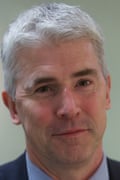Grappling with the burning environmental issues of climate change, resource scarcity, poverty and population growth, it’s easy to feel powerless. However, one approach gaining popularity in the world of sustainability is systems thinking. This looks at systems in their entirety and seeks holistic remedies, rather than concentrating on discrete problems.
It is an approach that businesses are beginning to embrace as they look to transform their organisations and embed environmental and ethical practices into their everyday activities. It requires businesses to change their corporate purpose. But where do they start?
To discuss how systems thinking can help business leaders transform their organisations, the Guardian, in association with PwC, brought together about 50 company bosses, leaders in sustainability and academics to discuss the issue. They split into four working groups to share best practice and debate how systems thinking offers a practical way of introducing environmental and social thinking into business activities.
Each group then reported back to the conference; this was followed by a panel discussion.
One of the biggest problems for any large organisation looking to transform its approach is overcoming silos and power bases – different departments tend to work independently and resist outside change. Jane Clark, climate change adviser and head of learning at the Department for International Development, said: “The problem is with silos – system thinking is the antithesis of that.”
Clark gave an example of how systems thinking had changed approaches to forestry. Thirty years ago this was simply about planting trees, measuring them and cutting them down. “Now if we define a forestry project it’s about governance, it’s about markets, it’s about partnerships, it’s about working with the EU on trade law around timber. That’s an example of where the development world is shifting from the technocratic view towards a much more holistic way of thinking,” she said.
A significant challenge for businesses is deciding how to start a transformation programme. PwC’s global corporate responsibility leader Lisa Greenlee told a working group discussion that a few years ago the company began training about one quarter of its staff in sustainability issues to create a “tipping point”.
“If you get enough influential people in your organisation starting to think in a new way then they can start to be the change agents,” Greenlee said.

Estelle Brachlianoff, senior executive vice president for the UK and Ireland at environmental services company Veolia, said the business had identified 40 employees as change agents, not for their expertise in sustainability, but because they were influencers who would carry other employees with them.
Brachlianoff explained that Veolia has transformed its corporate purpose away from being simply a waste-disposal company to become a mining and chemicals business working in the circular economy. It has created a project producing energy for 5,000 homes in Southwark, south London, using black bin bag refuse.
Veolia has also found ways of extracting minerals from street sweepings, such as palladium emitted by car exhausts, and has manufactured plastics made from human waste.
“We are not solving the whole circularity of the entire world, but I have a list of examples of real business cases that are happening now in the UK. We want to show our customers that it is possible,” she said.
Collaboration and participation were strong themes in the discussion, as business transformation requires partnerships between organisations that would often never work together. Chris Cook, global sustainability director at paint manufacturer AkzoNobel, said the company was looking at recycling the paint left over after decorating that tends to sit in cans in sheds and garages.
AkzoNobel went into partnership with a small business that had the same goals, because it would have struggled to achieve its aims had the project been carried out internally. “We are working with small companies – something we normally never do –because we’re beginning to realise that there are too many barriers due to our own systems,” Cook said.
A prime opportunity for implementing change is when businesses relaunch their processes after a change in market conditions or when introducing new technology. But as Baran Osmanoğlu, a business transformation consultant working in France, told the discussion, companies she has worked with have been resistant to introducing sustainable practices. “Usually the answer is: ‘Yes, but the cost will be higher.’ Or: ‘I’m so used to doing my job that way. What you say is nice, but maybe later.’”
A positive outcome of taking a system-wide approach to transforming businesses is that the usual blame game associated with environmental lobbying could become a thing of the past. As Nadine McCormick, programme officer at the International Union for the Conservation of Nature, said: “It’s not about blaming people, but looking at the systems and why they failed.”
McCormick said that it would be helpful if the Guardian “stopped pointing fingers” at people and corporations, and instead outlined the system issues that had gone wrong and how they should be addressed. The discussion heard about attempts to transform the way business leaders and their customers view the purpose of organisations. Jan Levy, managing director of consultancy Three Hands, described how he had liaised with business leaders from British Gas to help them work with an affordable warmth group in Birmingham.
“We exposed business leaders to the social issues surrounding people’s need for warmth, health, affordability and safety and the relevance that had to their business. It gave them an understanding of what life is like if you are living in fuel poverty.” Levy said that the aim was “to make it more real for them”.

Picking up on this, PwC’s partner for sustainability and climate change, Geoff Lane, told the panel: “How do you get more people to think along these lines? In my opinion, there isn’t any substitute for first-hand experience. You can do the theoretical bit online, but you’ve got to immerse people into systems situations.”
Meanwhile James Tiernan, energy and environment manager at Unite Students, a provider of accommodation for 43,000 UK students, said his role was to get these residents to act more sustainably, something that would save energy and water costs for the company. Tiernan said the company had tried to embed a system-wide approach to sustainability by stealth. “What we’ve ended up with is a flexible tool kit that can be given to 140-odd buildings across the country locally, in a way that is right for them.”
Floor tile company Interface, which has strong ethical and environmental policies, was considered by the panel to be a good example of a company that had made an effective transformation to sustainability.
Nicola Millson, managing director of sustainability consultancy 6heads, who has done consultancy work with Interface, said: “[Interface] stands out because, in some ways, it is not as process-driven. It really doesn’t like process, which allows a lot of space for people to explore and experiment.”
John Hutton, head of sustainability at construction giant Bam Nuttall, added that it is important to remember in any review of corporate purpose that sustainability is about humanity. “It is about bringing more humanity to work if we want our businesses to be more sustainable. It’s about embracing that emotion,” he said.

Prof Stephen Martin, honorary professor at the University of Worcester, told the panel that there is so much complexity in organisational systems that they can appear to be beyond change. Finding ways to cut through this complexity is the great challenge of systems thinking. “This is a huge dysfunctional mess that systems thinking can help clean up,” he said.
Richard Spencer, head of sustainability at accountancy body ICAEW, said that the accountancy profession needed to look at the core purpose of business and how this is accounted for. Ultimately, businesses need to move away from a profit-first approach.
“Wouldn’t it be better to say that as a business you have a purpose – for example, a pharma company’s is to make people well – and that to fulfill that purpose we have a socially constructed model that is a profit model?” Spencer said.
This would put social purpose before profit and ensure that businesses take into account their wider responsibilities to the world. Such a system-wide approach could be just what’s needed to change the practices of companies so they can help solve humanity’s problems.
On the panel
Jo Confino (Chair)
Executive editor, the Guardian
Estelle Brachlianoff
Director, UK and Northern Europe, Veolia Environment
Geoff Lane
Partner, PwC
Stephen Martin
Honorary professor, University of Worcester
The systems thinking series is funded by PwC. All content is editorially independent except for pieces labelled advertisement feature. Find out more here.
Join the community of sustainability professionals and experts. Become a GSB member to get more stories like this direct to your inbox.

Comments (…)
Sign in or create your Guardian account to join the discussion